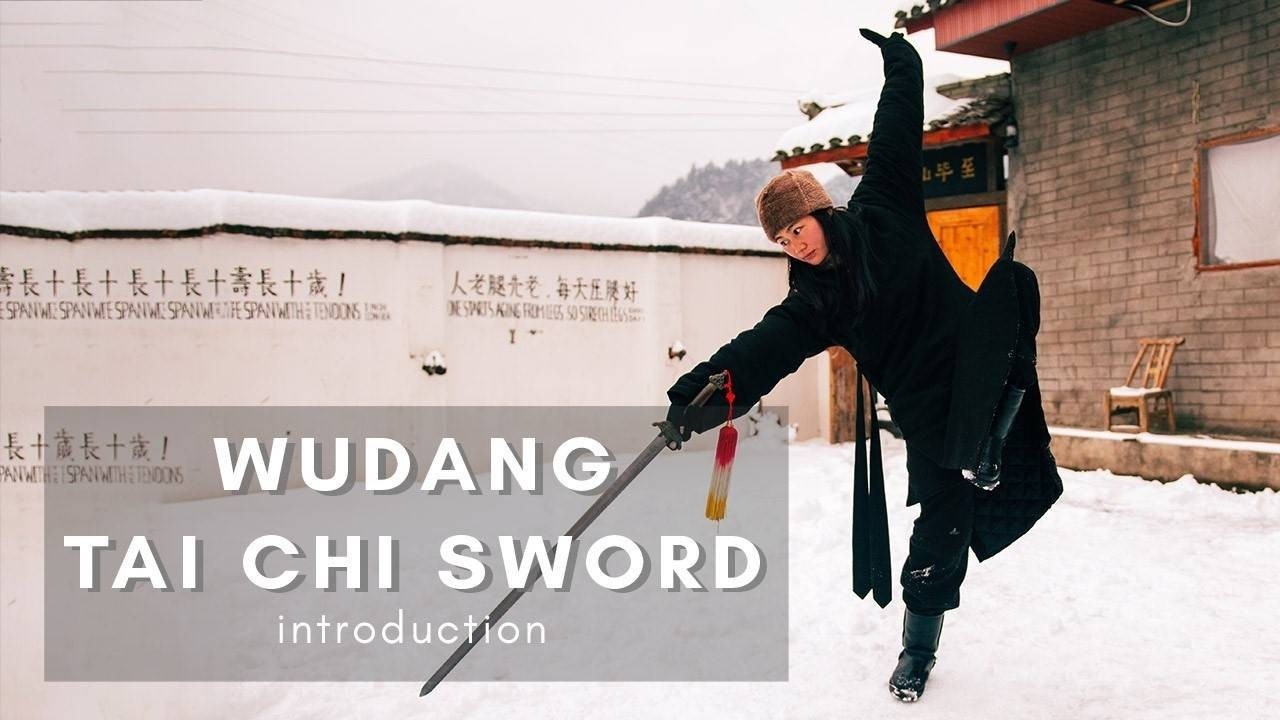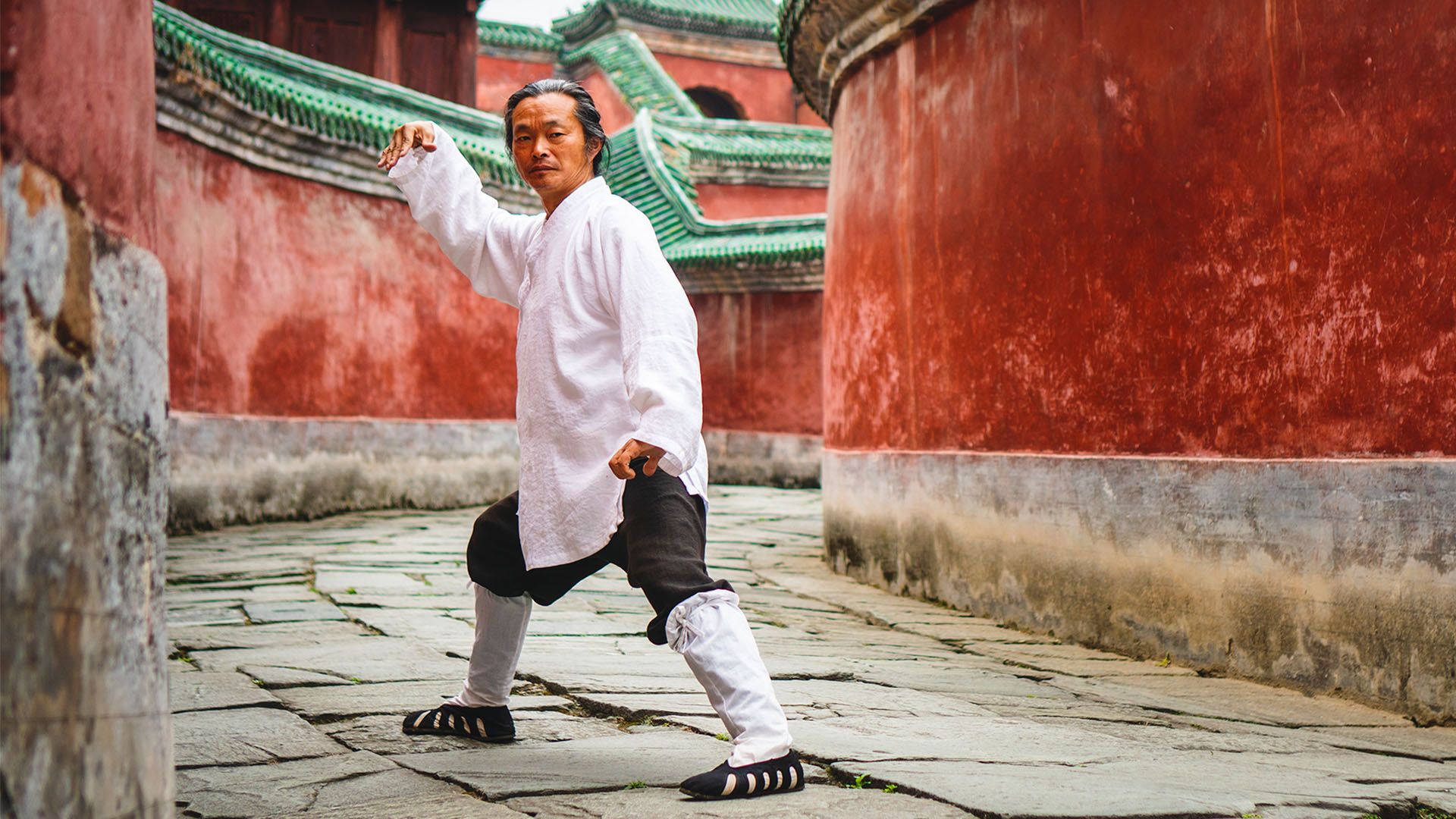Wudang San Feng Tai Chi Sword (Jian) – Introductory Guide
Oct 06, 2024
Once a practitioner has made happy progress in the bare-handed Tai Chi forms, the natural next step is to start learning a weapon's form. We talk about this in a separate post, which you will find here.
In this post, let’s look into the sword form that Master Gu teaches at the WTWA in the Wudang Mountains. This is the same sword form that is also included in the Tai Chi courses at the Online WTWA: Wudang Sanfeng 64 Sword Form.
This tàijíjiàn (剑 jiàn means “straight sword”) form not only has its roots in the mystical Wudang Mountains. It also takes its name from the legendary Zhang Sanfeng (张三丰), the Taoist immortal who is credited with being one of the founding fathers of Tai Chi.
To find out a bit more about the form, here is a brief introduction.
San Feng 64 Sword: A Whole World to Explore
Little is known about this almost mythical Zhang Sanfeng, but we know that for the sword form, he is said to have borrowed elements from various existing Tai Chi sword forms. He then combined these into the 64 movements and positions that make up what we now call Sanfeng 64 Sword Form.
As always, each of these has a name; you will find them rendered in both Mandarin, pinyin, and English at the end of this post. Once you start to learn the form, take some time to read them a few times. Even saying them out loud while practicing; the poetry of the names can really improve your embodied comprehension of what you are doing. What’s more, they are just beautiful and highly enjoyable, from
“Part grass, seek snake”
to
“Wild horse leaps over ravine”.
Oh yes, in Sanfeng 64 Sword Form, you get to meet or even be a boy fishing, a rider on a powerful steed, a monkey, a tiger, a dragon…even the giant bird Peng, whom you may know from the beginning of Zhuangzi’s Inner Chapters!
“It is named the Peng, so huge no one knows how many thousand li he measures. Aroused, it soars aloft, its wings like clouds hung from the sky.” (from chapter 1 of the Zhuangzi)
In some moments, the martial roots of Tai Chi are clearly present and can be felt, for example, when executing an attack or by contrast blocking one. At other times, there are slow, careful movements that reflect the way you would imagine a snake and a crane to prepare for their next tussle.
Sanfeng 64 Sword genuinely tells dozens of stories that take you on a journey as you practice it. Remember to stay present at the moment, though, lest your attention weaken and your imagined opponent get the upper hand!
Take the next step in your Tai Chi practice
In essence, the Sanfeng 64 Sword form introduces an instrument to your practice, extending beyond your body's limits. This form, deeply rooted in Wudang martial arts, is significantly longer than other Wudang Tai Chi forms you might have encountered, requiring 6 to 10 minutes to execute. Your focus could be on its martial, meditative, or health-enhancing aspects, each shaping the form's duration and style.
Therefore, mastering this form demands more time and dedication, as well as ample physical space for safe practice. Seek out a suitable training area, ensuring you have enough room to maneuver your sword without risk. Approach this journey step by step, building on the foundations of your previous training sessions. Embrace the rhythm of learning: practice, refine, block, and thrust. This progressive path marks a significant milestone in your Tai Chi journey, signaling your advancement towards mastering the art of Wudang Taiji.
When you have learned it, it will take much practice, as always, to master it, and as always, this is time well spent and well enjoyed. Who knew there was a swordsperson in you!
---
Eli Roovers, Taoist name: 丹宁资和
16th-generation Sanfeng Pai disciple and Taoist Wellness Instructor

How to learn Wudang Taiji Sword with Master Gu Online
If you would like to learn Wudang Sanfeng 64 Tai Chi Sword Form with Master Gu, you are warmly invited to join the Online Wudang Taoist Wellness Academy. The academy is designed to help you live long and well. It teaches Tai Chi, Qi Gong, and Taoist philosophy from the Wudang Mountains, China.
In year 2, online academy students get in-depth tuition for the Sanfeng 64 Sword Form. You also can learn:
- Wudang 8, 33, 28 and 33 Taiji forms.
- Step-by-step tuition of 5 animal Qi Gong, Six-healing sound Qi Gong and Ba Duan Jin Qi Gong.
- A powerful morning meridian adjustment Qi Gong
- “Tu Na” expelling the old and inhaling the new.
- How to stand strong like a tree.
- Linguistically guided Qi Gong meditations
- Immortal’s Waterfall breathing technique
- Taoist philosophy lectures
- +more!
Students also get to join Master Gu for a live Zoom Q&A every month to ask their questions. If you are interested in becoming a student, click here to learn more!
Please note: the Sanfeng Sword tuition is in your second year of being a student of the online academy. Tuition is released over time to replicate how you would learn if you came to the physical academy. This means you get to enjoy new content over the time you are a student with us and get deeper into your practice.

三丰太极剑
Sanfeng Tai Chi Jian
顾师宁演练
Gu Shining Practice
|
1 |
预备起 式 |
yù bèi qǐ shì |
Preparatory form |
|
2 |
虚步托剑 |
xū bù tuō jiàn |
Empty step, hold sword |
|
3 |
上步合剑 |
shàng bù hé jiàn |
Forward step, close sword |
|
4 |
仙人指路 |
xiān rén zhǐ lù |
Immortal person shows direction |
|
5 |
三环套月 |
sān huán tào yuè |
Three rings hook moon |
|
6 |
上步点剑 |
shàng bù diǎn jiàn |
Forward step, point sword |
|
7 |
大魁星式 |
dà kuí xīng shì |
Big Kui star form |
|
8 |
左右拦扫 |
zuǒ yòu lán sǎo |
Sweep left and right |
|
9 |
童子提炉 |
tóng zǐ tí lú |
Young boy lifts stove |
|
10 |
转身刺剑 |
zhuǎn shēn cì jiàn |
Turn around, thrust sword |
|
11 |
双手捧剑 |
shuāng shǒu pěng jiàn |
Double hands hold sword |
|
12 |
野马跳涧 |
yě mǎ tiào jiàn |
Wild horse leaps over ravine |
|
13 |
金蛇盘柳 |
jīn shé pán liǔ |
Golden snake winds around willow |
|
14 |
燕子出林 |
yàn zǐ chū lín |
Swallow comes out of woods |
|
15 |
大鹏展翅 |
dà péng zhǎn chì |
Big bird Peng spreads wings |
|
16 |
虚步捧剑 |
xū bù pěng jiàn |
Empty step, hold sword |
|
17 |
左右旋风 |
zuǒ yòu xuàn fēng |
Whirlwinds from left and right |
|
18 |
太公钓鱼 |
tài gōng diào yú |
Tai Gong goes fishing |
|
19 |
拨草寻蛇 |
bō cǎo xún shé |
Part grass, seek snake |
|
20 |
左右磨剑 |
zuǒ yòu mó jiàn |
Sharpen sword left and right |
|
21 |
怀中抱月 |
huái zhōng bào yuè |
Hug moon to chest |
|
22 |
宿鸟投林 |
sù niǎo tóu lín |
Evening birds return to woods |
|
23 |
乌龙摆尾 |
wū lóng bǎi wěi |
Black dragon waves tail |
|
24 |
青龙出海 |
qīng lóng chū hǎi |
Green dragon goes out of sea |
|
25 |
风卷荷叶 |
fēng juàn hé yè |
Wind rolls lotus leaf |
|
26 |
狮子摇头 |
shī zǐ yáo tóu |
Lion shakes its head |
|
27 |
野马跳涧 |
yě mǎ tiào jiàn |
Wild horse leaps over ravine |
|
28 |
悬崖勒马 |
xuán yá lè mǎ |
Curb horse at cliff |
|
29 |
虚步亮指 |
xū bù liàng zhǐ |
Empty step, show fingers |
|
30 |
白猿献果 |
bái yuán xiàn guǒ |
White ape offers fruit |
|
31 |
迎风弹尘 |
yíng fēng dàn chén |
Dust clothes into the wind |
|
32 |
顺水推舟 |
shùn shuǐ tuī zhōu |
Push boat along stream |
|
33 |
流星赶月 |
liú xīng gǎn yuè |
Shooting star chases moon |
|
34 |
天马行空 |
tiān mǎ xíng kōng |
Heavenly horse prances across sky |
|
35 |
踏雪寻梅 |
tà xuě xún méi |
Step on snow seeking plum |
|
36 |
金花落地 |
jīn huā luò dì |
Golden flower falls on ground |
|
37 |
金猴挑帘 |
jīn hóu tiāo lián |
Golden monkey raises curtain |
|
38 |
燕子衔泥 |
yàn zǐ xián ní |
Swallow carries mud with mouth |
|
39 |
野马分鬃 |
yě mǎ fēn zōng |
Wild horse parts manes |
|
40 |
莺飞满天 |
yīng fēi mǎn tiān |
Warblers fly in the sky |
|
41 |
游龙戏水 |
yóu lóng xì shuǐ |
Swimming dragon plays with water |
|
42 |
海底捞月 |
hǎi dǐ lāo yuè |
Get moon from beneath sea |
|
43 |
夜叉探海 |
yè chā tàn hǎi |
Ye Cha inspects sea |
|
44 |
犀牛望月 |
xī niú wàng yuè |
Rhino looks at moon |
|
45 |
抽身射雁 |
chou shēn shè yàn |
Pull bow string, aim at wild goose |
|
46 |
白猿献果 |
bái yuán xiàn guǒ |
White ape offers fruit |
|
47 |
青龙探爪 |
qīng lóng tàn zhuǎ |
Green dragon stretches paw |
|
48 |
凤凰展翅 |
fèng huáng zhǎn chì |
Phoenix spreads wings |
|
49 |
白鹤亮翅 |
bái hè liàng chì |
White crane spreads wings |
|
50 |
仙人画图 |
xiān rén huà tú |
Immortal person draws picture |
|
51 |
白猿献果 |
bái yuán xiàn guǒ |
White ape offers fruit |
|
52 |
左右落花 |
zuǒ yòu luò huā |
Flowers fall left and right |
|
53 |
玉女穿梭 |
yù nǚ chuān suō |
Jade maiden sends shuttle |
|
54 |
白虎搅尾 |
bái hǔ jiǎo wěi |
White tiger shakes tail |
|
55 |
鱼跃龙门 |
yú yuè lóng mén |
Fish leap over dragon gate |
|
56 |
乌龙绞柱 |
wū lóng jiǎo zhù |
Black dragon twists around pole |
|
57 |
玉女探花 |
yù nǚ tàn huā |
Jade maiden for flower |
|
58 |
顺风扫叶 |
shùn fēng sǎo yè |
Sweep leaves with the wind |
|
59 |
平托天罡 |
píng tuō tiān gāng |
Evenly carry Big Dipper’s handle |
|
60 |
运转八卦 |
yùn zhuǎn bá guà |
Turn around eight trigrams |
|
61 |
力截金石 |
lì jié jīn shí |
Forcefully cut golden stone |
|
62 |
巧女缝针 |
qiǎo nǚ féng zhēn |
Smart maiden sews with needle |
|
63 |
白云罩顶 |
bái yún zhào dǐng |
White cloud caps head |
|
64 |
鸣金收兵 |
míng jīn shōu bīng |
Hit drum to announce end |







